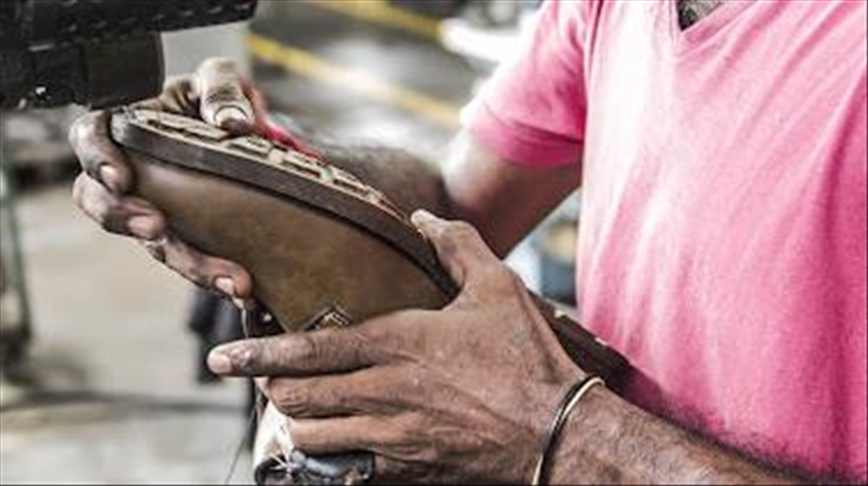
HARARE, Zimbabwe
In the beginning, 24-year-old Richard Mbirimu was just a desperate ordinary shoe vendor on the streets of Zimbabwe’s capital Harare.
But four years later, he has progressed, turning into a shoemaker as well.
This Mbirimu said he is doing from a makeshift market stall in Harare’s oldest township known as Mbare at a spot known as Magaba, where hordes of backyard industrialists are thriving here in the capital.
Mbirimu is one of them.
His roadside work station is stocked with just the essentials, amongst which is an old sewing machine as well as a grinder used to smoothen the soles of the shoes that he makes on his own.
Daily now, Mbirimu has become one of the informal backyard shoemakers hard at work, designing and making shoes for a specific clientele using his aged shoe-sawing machine he acquired from one of the veteran shoemakers in Harare.
Forced by circumstances
An untrained shoemaker, Mbirimu said Zimbabwe’s turbulent economy forced him to transform himself from a mere shoe vendor into an ultimate footwear producer.
Now, backyard shoemakers like Mbirimu here have become a big hit in Zimbabwe, drawing customers from various backgrounds across the country who have not been spared by the country’s teetering economy, leaving them to only afford homemade footwear from people like Mbirimu.
Many are like 47-year-old Amanda Siwela in Harare, a single mother of four school going children.
“I am a vendor, and my husband went to South Africa six years ago to look for a job and never returned, and I don’t know if he is still alive because he has never communicated. Buying shoes on the street is all I can afford for my children because prices are very low and also negotiable,” she told Anadolu Agency.
Capitalizing on desperation
This has turned into a plus for many backyard shoemakers like Mbirimu, whose business has boomed, meaning for him, pastures are getting greener and greener.
“Very few people here afford getting into proper formal shops to buy footwear, and I’m capitalizing on that, making the shoes you see here using affordable material,” he told Anadolu Agency.
Zimbabwe’s youths like Mbirimu, drawn often from poor backgrounds, have taken to making shoes on their own which they sell on the streets in towns and cities.
Many like Mbirimu admit they are making a living from the self-made shoes sold cheaply to desperate people here hit hard by the nation’s faltering economy.
According to the Zimbabwe Congress of Trade Unions (ZCTU), more than 90% of Zimbabweans are unemployed.
Economic diehards thriving
Such informal economic diehards are backyard shoemakers like Mbirimu, who has also now rallied several vendors behind him to sell the shoes he produces.
“I have created employment for vendors who come to me to then take my shoes on the streets to sell, and I pay them a commission in return for their services,” he said.
According to Mbirimu, a single pair of shoes from him costs anywhere between 25 to 40 US dollars on the streets.
From the amount, he each time has to subtract a 5% commission to reward vendors who tout for customers on his behalf while he busies himself making more and more shoes.
Profiteering with homemade shoes
Mbirimu claimed that on a good day, he sells roughly 10 to 15 pairs of shoes, and with the money he said he is making each day, he said he “will never wish to look for a job.”
“I’m my own permanent employer and imagine I make about $250 to $300 every day, from which I pay the vendors who get customers for me and from which I also subtract some little amount to buy raw materials,” he said.
Wisborn Malaya, secretary general of the Zimbabwe Chamber of Informal Economy Associations, has gone on record in the media as saying that the country’s manufacturing sector is a fast-growing area for informal employment.
According to Malaya, “the shoemaking business is quite a big industry and has played a very big role in terms of employment creation.”
Statistics from the Harare United Cobblers Association, an organization of young informal shoemakers like Mbirimu, show that approximately 200,000 youths aged between 19 and 24 have set up shop on street corners across towns and cities here, selling handmade shoes produced by many self-taught shoemakers like Mbirimu.
Anadolu Agency website contains only a portion of the news stories offered to subscribers in the AA News Broadcasting System (HAS), and in summarized form. Please contact us for subscription options.

